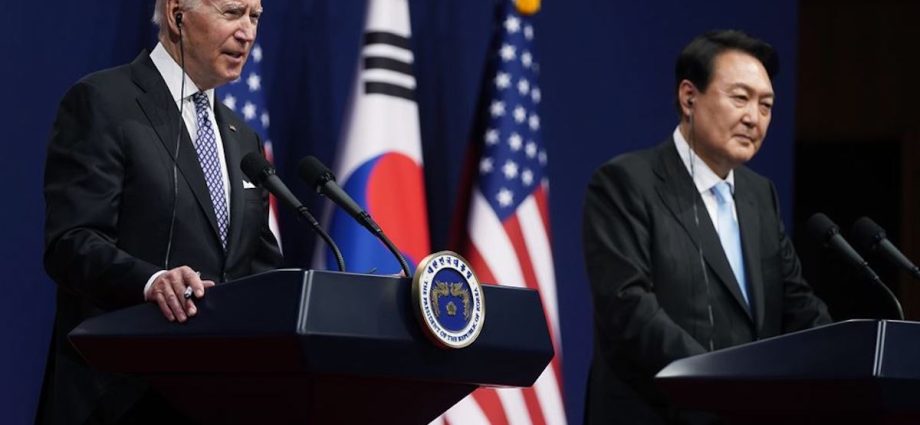
Japan and South Korea are strong US allies, and these three countries also share mutual interests in reinforcing the so-called “liberal and rules-based order” in the Indo-Pacific region as well as the international community.
The national security of Japan and South Korea has been drawn together through common threats and their security ties with the US. Recently, the three countries agreed to work toward establishing a mechanism for sharing real-time data on several missile launches by North Korea this year.
The trilateral mechanism among Japan, South Korea and the US improved in 2022, inspired by North Korea’s nuclear ambitions and the election of South Korean President Yoon Suk Yeol. Most noteworthy in recent times was the Phnom Penh statement in November 2022 on a Japan-US-Korea trilateral partnership for cooperating in the Indo-Pacific region.
However, historical hostility between Japan and South Korea has been a challenge to this trilateral cooperation. Both nations host a high number of US troops and both have also signed security partnerships with the US.
However, in March this year, President Yoon and Japanese Prime Minister Fumio Kishida held a meeting that was a big step toward rebuilding their security and economic ties, and the two nations sought to unite through mutual concerns over North Korea’s nuclear capabilities and China’s expansionist behavior.
It is clearly beneficial for both Japan and South Korea to cooperate with the US to be realistically prepared for uncertainties on the Korean Peninsula. These three nations aim to attenuate the North Korean threat and embrace the concept of hedging against China’s rise.
The North Korean threat has intensified over time as it fired a record number of missiles in 2022, and this has further propelled Japan-South Korea-US trilateral cooperation. Therefore, North Korean threats will perhaps keep trilateral cooperation in place. Moreover, South Korea’s aim of nuclear planning and Japan’s aim to possess long-range strike capabilities could be issues boosting trilateral cooperation.
Regarding growing Chinese assertiveness, Japan aims to oppose China’s attempts to alter the status quo, while South Korea has adopted a relatively appeasing approach aimed at maintaining its economic relationship with China.
Tokyo and Seoul also differ in their stances on the Taiwan issue. Japan has been in support of Taiwan’s security, while South Korea has avoided direct commitments to establishing stability in the Taiwan Strait.
For its part, the US has been working toward increasing its military as well as political support for Taipei through elevated defense cooperation and regular official visits by politicians.
The United States is keen on continuing to work deeply with Japan and South Korea to ensure peace and stability in the Indo-Pacific region. Recently, President Yoon visited the United States, where he and US President Joe Biden reached an agreement that would allow an increased level of deployment of US assets around the Korean Peninsula.
Furthermore, Biden has also invited Kishida and Yoon for a formal trilateral meeting to discuss issues and challenges in depth.
North Korea’s nuclear ambitions
North Korea’s media criticized plans of South Korea, Japan and the US to share real-time data on its missile launches, calling the move a way of strengthening military cooperation among these three countries.
The defense chiefs of the US and Japan emphasized the need for trilateral cooperation with South Korea after a North Korean rocket carrying a spy satellite failed, which led to an emergency alert for Japan’s Okinawa prefecture.
Pyongyang’s nuclear tests and missile launches threaten the stability in the region and also violate international law.
North Korea’s nuclear arsenal has been building up, which also includes the development of missiles capable of delivering atomic bombs anywhere in the US. This has further concerned Japan regarding America’s nuclear umbrella. However, the US has reaffirmed its commitment to Japan time and again and also works toward extending deterrence through the US nuclear capabilities.
Furthermore, trilateral defense cooperation has grown deeper in recent times after the rapprochement between South Korea and Japan. Their cooperation involves trilateral military drills for practicing the tracking of North Korea’s missile launches and information-sharing exercises.
Japan’s Defense Ministry has also warned that it will destroy North Korean missiles they it enter its territory. Moreover, the ministry has been taking concrete precautions that involve deploying Patriot missile defense batteries.
Trilateral in the Indo-Pacific
As far as the Indo-Pacific region is concerned, the US, South Korea and Japan have mutual interests in bolstering the “rules-based order.” These three nations must contribute to embracing economic connectivity in the region.
For instance, the US and South Korea should consider joining the Comprehensive and Progressive Agreement for Trans-Pacific Partnership (CPTPP). Japan, the US and South Korea must enhance their security cooperation to tackle North Korea’s nuclear threats through intelligence sharing as well as military and security consultation.
A free and open Indo-Pacific is vital for all three nations to maintain prosperity, democracy and security and to counter China’s rise and influence. It has become essential to create a structure for peace and stability for safeguarding democracies in Northeast Asia.
To ensure a coordinated response to challenges faced in light of North Korea’s nuclear ambitions, the US, South Korea and Japan need to work on improving their interoperability for conducting joint operations.
In South Korea’s recent National Security Strategy, emphasis is laid greatly on cooperation with Japan and the US and further pursuing value-based diplomacy that involves freedom, rule of law and democracy.
The strategy has also focused on the increased need for strengthened trilateral cooperation, and for this mechanism to flourish in coming years, there is a need to transform and improve Korea-Japan ties.
The three countries possess potent economic, military and political power but need to do more to counter threats from China and North Korea.

